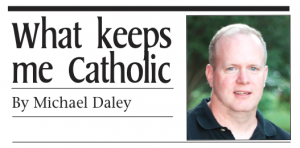What keeps me Catholic? Internet trolls
You know you’re getting old when words you knew so well from childhood change their meaning…without you even being aware of it. Take “troll” for example. Growing up I associated trolls, always grouchy and hungry, with the classic fairy tale “Three Billy Goats Gruff.” Come to find out trolls no longer live under bridges, they reside on the internet now.
One usually meets these trolls not in the articles or blog posts themselves but in the responses to them. Sometimes, though, they’ll join in on-line chats. What usually follows is a stream of mean-spirited comments, baiting remarks, and one-sided observations. Little charity is evidenced, rather self-righteousness.
This was realized first hand the other day when I visited the website of a Catholic newspaper. The article I was reading at the time was current, newsworthy, and warranted further feedback and ongoing conversation.
Anticipating the comments following it, I was met instead with an editor’s note: comments will be suspended indefinitely. The editor remarked that, despite the interactive, “rough-and-tumble Internet world, where arguments tend to be more freewheeling,” the malicious, abusive, vile, appalling, and demeaning nature of the comments that had bombarded their site in recent days necessitated this change in policy.
How does this square then with Pope Francis’ recent World Communications Day statement in which he said, “The internet…offers immense possibilities for encounter and solidarity. This is something truly good, a gift from God?” I believe it has everything to do with the ideal and real being in tension with one another.
Trolls love speedy, knee jerk reactions. They know how to play off of or, better said, prey off of peoples’ sensitivities and insecurities. Their goal is to provoke unthinking, emotional responses. In the end this only confirms the troll’s opinion. Conversations, however, rely on patience, careful thought, and good will. As Pope Francis noticed: “The speed with which information is communicated exceeds our capacity for reflection and judgment, and this does not make for more balanced and proper forms of self-expression. The variety of opinions being aired can be seen as helpful, but it also enables people to barricade themselves behind sources of information which only confirm their own wishes and ideas, or political and economic interests.”
In modeling true conversation I’ve long tried, but often failed, to put into practice a central adage of St. Ignatius of Loyola. One of the principles undergirding his Spiritual Exercises is this: “It should be presupposed that every good Christian ought to be more eager to put a good interpretation on a neighbor’s statement than to condemn it.” Thus, as Pope Francis urged upon the Roman Curia, we too must exercise a “conscientious objection to gossip.” Otherwise, civil discourse devolves into secretive cursing.
It goes without saying that conversations need partners as well. Conversations demand dialogue, freedom, give and take. Trolls on the other hand really like to talk only to themselves. Their preferred form of communication is the monologue. But, to quote Pope Francis again, “To dialogue means to believe that the ‘other’ has something worthwhile to say, and to entertain his or her point of view and perspective. Engaging in dialogue does not mean renouncing our own ideas and traditions, but the claim that they alone are valid or absolute.”
What keeps me Catholic then? It’s knowing that I am a member of a faith tradition that seeks conversation. That’s not afraid of talking with someone who may have different ideas or belong to another religion than I do.
Conversation, in this case, is missionary. Why we proclaim the Gospel message, how we share the beauty of God, when we offer the balm of Christ, all communicate the presence, or absence, of Jesus to the world.
Trolls look out.
Michael Daley is a freelance writer and teacher at St. Xavier High School.
This What Keeps Me Catholic column by Michael Daley originally appeared in the March 2014 print edition of The Catholic Telegraph.














